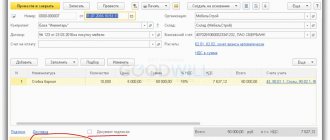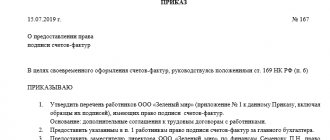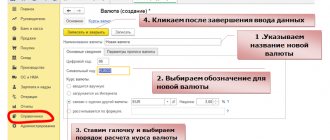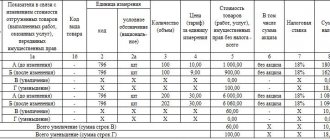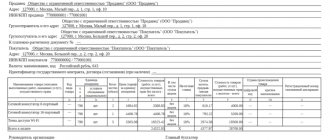Intermediary activities are formalized by an agency agreement and must be accompanied by competent documentation - in accounting, such transactions are reflected in accordance with the established provisions of the accounting policy (PBU 1/2008), and the criteria for maintaining books of sales and purchases and issuing invoices (SF) must comply with the Rules , approved by Government Decree No. 1137 of December 26, 2011 (as amended on January 19, 2019).
Both parties to the agency agreement have to issue invoices to each other. Let's figure out in what situations and which of the parties to the transaction needs to do this. The publication does not consider the issuance of a SF by an intermediary for an agent's remuneration (including payment in advance from the principal's amounts), since this document is drawn up in the usual manner, meaning the presentation of the amount of remuneration for the work performed, indicating VAT and serving as the basis for claiming tax for deduction.
Basics of mediation relationships
In economic activity involving an intermediary, there are three participants.
The first is a person who sells or purchases goods (work, services) with the involvement of an intermediary, the second is a third-party supplier or buyer, the third is an intermediary between them. Russian legislation contains three legal forms for carrying out intermediary activities: 1) commission agreement (Chapter 51 of the Civil Code of the Russian Federation), the principal attracts a commission agent; 2) agency agreement (Chapter 52 of the Civil Code of the Russian Federation), the principal attracts an agent;
3) contract of agency (Chapter 49 of the Civil Code of the Russian Federation), the principal engages an attorney.
The intermediary (commission agent, agent, attorney) undertakes, for a fee, to carry out legal and other actions (transactions) on behalf of the principal (principal, principal) on behalf of the principal (principal, principal) on his own behalf, but at the expense of the principal (principal, principal) or on behalf and at the expense of the principal (principal) , principal).
An activity that is intermediary in economic content can be formalized in an agreement containing other terms (for example, the attorney is named “Executor”). If business transactions must be reflected in the accounting registers on their merits (paragraph 5 of clause 6 of PBU 1/2008 “Accounting Policy of the Organization”, approved by Order of the Ministry of Finance of the Russian Federation dated October 6, 2008 N 106n), then the rules for filling out invoices, maintaining purchase books and sales books (approved by Decree of the Government of the Russian Federation of December 26, 2011 N 1137) include the exact names:
- agent and commission agent in the Rules for filling out an invoice (Appendices N1 and N2 to Resolution N1137) and the rules for maintaining a purchase book (Appendix N4);
- commission agents (agents, attorneys) in the rules for maintaining a sales book (Appendix N5).
According to the author, in order to avoid claims from tax authorities when re-invoicing VAT by an intermediary, when concluding an agreement, you should use the names established by the Civil Code of Russia.
I would also like to draw your attention to the overbilling by the landlord of utility costs and the cost of electricity to the tenant when renting out premises. Essentially, the lessor acts as an intermediary between the tenant and energy supply organizations, however, contracts with these organizations, as a rule, are concluded by the lessor before concluding a transaction with the tenant. Consequently, the same condition of all three types of intermediary agreements specified in the Civil Code of the Russian Federation is not met (Articles 971, 990, 1005 of the Civil Code of the Russian Federation): the action of an intermediary on behalf of the principal (principal, principal). Thus, the extension of the rules approved for commission, agency and commission agreements to compensate for the landlord’s expenses, in the author’s opinion, does not comply with the law.
The intermediary issues invoices for his own remuneration (including payment in advance by deduction from the amounts received for the principal, principal, principal) in the usual manner, which is not discussed in this article.
The person engaging the intermediary is hereinafter referred to as the “principal”.
Features of re-invoicing
An invoice is both confirmation of acceptance of products and the basis for deduction for VAT. The corresponding provision is stipulated in Article 169 of the Tax Code of the Russian Federation. It is necessary to take into account the specifics of the procedure in which an agency agreement is present. In this case, an additional link is formed between the seller and the consumer - an agent. It works in the interests of the consumer (Article 1005 of the Civil Code of the Russian Federation).
Initial SFs are issued to the agent. For the principal to use the deduction, you need to re-issue the SF to him. That is, the agent needs to provide the principal with the SF when transferring authority for the products.
The Federation Council is drawn up in a certain form. All the nuances of its preparation are specified in Government Decree No. 1137 of December 26, 2011. Re-listing of paper is carried out by an agent who acts on his own behalf.
The agent is considered to be directly involved in the re-registration if these conditions are met:
- Execution of instructions under agreement.
- Working on your own behalf.
Re-listing must be carried out on the basis of the law.
Situation 1. Purchase of goods on behalf of an intermediary at the expense of the principal
The principal instructs the intermediary on his own behalf, but at the expense of the principal, to find a suitable supplier and agree on the supply of goods (works, services) for the principal.
Invoices received by the intermediary from the supplier:
- are subject to registration by the intermediary in part 2 of the journal for recording the issuance of received and issued invoices (clauses 10, 11 of the Rules for maintaining a journal for recording received and issued invoices used in VAT calculations (hereinafter referred to as the journal keeping rules), approved by Resolution N 1137 );
- are not subject to inclusion in the intermediary’s purchase book, since he does not have the right to deduct (clause “d”, clause 19 of the Rules for maintaining the purchase book (hereinafter referred to as the rules for maintaining the purchase book), approved by Resolution No. 1137);
- must be copied, and copies must be certified and transferred to the principal (clause “a”, clause 15 of the journal keeping rules);
- reissued by the intermediary in the name of the principal.
Table 1. Information indicated by the intermediary in the invoice reissued in the name of the principal
| Invoice Line | Line filling order |
| Line 1 (number and date) | Serial number in accordance with the individual chronology of the intermediary Date of the invoice issued by the seller in the name of the intermediary (clause “a”, clause 1 of the rules for filling out an invoice used in VAT calculations (hereinafter referred to as the rules for filling out an invoice), approved by Decree of the Government of the Russian Federation of November 26, 2011 N1137) |
| Line 2 (seller) | Information about the seller who entered into an agreement with the intermediary: full or abbreviated name of the organization (clause “c” of paragraph 1 of the rules for filling out an invoice) |
| Line 2a (seller's address) | Location of the third-party supplier (paragraph “d”, paragraph 1 of the rules for filling out an invoice) |
| Line 2b (TIN and KPP of the seller) | TIN and KPP of a third-party seller (clause “d”, clause 1 of the rules for filling out an invoice) |
| Line 4 (consignee and his address) | Full or abbreviated name of the consignee (Principal) (clause “g”, clause 1 of the rules for filling out an invoice) |
| Line 5 (details of the payment document) | Numbers and dates of payment and settlement documents for the transfer of funds from the intermediary to a third-party supplier and from the principal to the intermediary (clause "h" clause 1 of the rules for filling out an invoice) |
| Line 6 (buyer) | Full or abbreviated name of the buyer (principal) (clauses “and” clause 1 of the rules for filling out an invoice) |
Re-issued invoices from the intermediary:
- are subject to registration in part 1 of the journal of received and issued invoices (clause 7 of the journal rules);
- are not subject to inclusion in the sales book, since the intermediary does not have an obligation to charge VAT (clause 3 of the Rules for maintaining the sales book (hereinafter referred to as the rules for maintaining the sales book), approved by Resolution No. 1137).
Reissued invoice received from the intermediary:
- the principal registers in part 2 of the journal for recording the issuance of received and issued invoices (clause 11 of the journal rules) and in the purchase book.
The principal is obliged for four years to keep copies of invoices (including adjustments, corrected ones) received by the principals on paper, issued by the seller of goods to the intermediary when purchasing goods for the principal, and transferred by the intermediary to the principal, duly certified by the intermediary for four years.
If the seller issues invoices (including adjustments, corrected ones) in electronic form, the principal must store invoices issued by the seller of the specified goods to the intermediary, received by the intermediary and transferred by the intermediary to the principal in electronic form (clause 13, paragraph “a” clause 15 of the journaling rules). A similar procedure for issuing a re-issued invoice is provided if the contract provides for prepayment when purchasing goods (works, services).
Legislative justification
Re-issuance of the SF is a procedure that is regulated by these regulations:
- Article 169 of the Tax Code of the Russian Federation . It states that invoices can be issued by agents selling goods/services on their own behalf.
- Articles 171, 172, 169 of the Tax Code of the Russian Federation . These articles indicate the conditions for deducting VAT. In particular, these are the following circumstances: acceptance of products for registration, use in work subject to VAT or use for resale, receipt of an invoice from the supplier.
- Article 1011 of the Civil Code of the Russian Federation . The SF is first filled out for the agent.
When filling out, you must take into account the provisions of Government Decree No. 1137 of December 26, 2011.
Situation 3. Sale of goods of the principal on behalf of the intermediary
The principal instructs the intermediary to sell the principal’s goods (works, services) to third parties on his own behalf.
Operations for sales through an intermediary on one’s own behalf are formalized by two invoices.
1. Intermediary:
- registers the invoice issued by him in the name of a third-party buyer upon shipment of goods in part 1 of the log of received and issued invoices (clause 7 of the journal rules);
- does not make an entry in the sales book, since the goods belong to the principal and the intermediary does not have an obligation to charge VAT (clause 20 of the rules for maintaining the sales book);
- informs the principal of the invoice indicators for re-invoicing by the principal on his behalf.
The obligations for the intermediary to provide the principal with certified copies of invoices issued by the intermediary to the buyer, as well as for the principal to store such copies, are not provided for by Resolution No. 1137 (Letter of the Ministry of Finance of the Russian Federation dated July 27, 2012 No. 03-07-09/92).
2. The principal, having received the indicators of the invoice issued by the intermediary, re-issues the invoice in the name of the third-party buyer and registers it in part 1 of the log of received and issued invoices and in the sales book (clause 7 of the journal rules, clause 20 of the rules maintaining a sales book).
Table 2. Information indicated in the invoice reissued by the principal in the name of the buyer
| Invoice Line | Line filling order |
| Line 1 (number and date) | Serial number in accordance with the individual chronology of the principal Date of the invoice issued by the intermediary in the name of a third-party buyer (clause “a”, clause 1 of the rules for filling out an invoice used for VAT calculations (hereinafter referred to as the rules for filling out an invoice |
| Line 2 (seller) | Information about the principal: full or abbreviated name of the organization (clause “c” of clause 1 of the rules for filling out an invoice) |
| Line 2a (seller's address) | Location of the principal (clause "d" clause 1 of the rules for filling out an invoice) |
| Line 2b (TIN and KPP of the seller) | INN and KPP of the principal (paragraph “e”, paragraph 1 of the rules for filling out an invoice) |
| Line 3(shipper) | Full or abbreviated name and postal address of the shipper (intermediary), if delivery is not carried out from the warehouse of the seller (principal); if delivery is carried out from the warehouse of the seller (principal), an entry is made “he” (clause “e”, clause 1 of the rules for filling out an invoice) |
| Line 5 (details of the payment document) | Numbers and dates of payment and settlement documents for the transfer of funds from the buyer to the intermediary and from the intermediary to the principal (clause “h” of clause 1 of the rules for filling out an invoice is similar to the case of purchasing goods (works, services) through an intermediary) |
| Line 6 (buyer) | Full or abbreviated name of the actual buyer (and not the intermediary) (clauses “and” clause 1 of the rules for filling out an invoice, Letter of the Ministry of Finance of the Russian Federation dated May 10, 2012 N 03-07-09/47) |
Having received a re-issued invoice from the principal (which indicates the date of the intermediary’s original invoice), the intermediary registers it in part 2 of the journal for recording received and issued invoices (clause 11 of the journal rules).
In this case, the intermediary does not make an entry in the purchase book (clause “c” of clause 19 of the rules for maintaining a purchase book). The principal must accrue VAT for payment in the period when the intermediary sold the goods to a third-party buyer (clause 1, clause 1, article 167 of the Tax Code of the Russian Federation). If the intermediary reports the shipment in the next period, the principal is obliged to draw up an additional sheet of the sales book and submit an updated VAT return.
A similar procedure for issuing a re-issued invoice is provided if the contract provides for prepayment when purchasing goods (works, services).
The author considers the disputes regarding the moment of determining the tax base when transferring goods to commission by moving them to the warehouse of the commission agent for sale to the buyer from the warehouse of the commission agent to be completed from the moment the Resolution of the Plenum of the Supreme Arbitration Court of the Russian Federation of May 30, 2014 No. 33 came into force. “16. The provisions of Article 167 of the Tax Code of the Russian Federation do not provide for special rules regarding the moment of determining the tax base for the sale of goods (work, services) with the involvement of third parties on the basis of agency agreements, commissions, and agency agreements. Consequently, the taxpayer is obliged to determine the tax base according to the rules of Article 167 of the Tax Code of the Russian Federation even in the case when it sells goods (work, services) with the participation of an attorney (commission agent, agent), ensuring for these purposes timely receipt of documents from the attorney (commission agent, agent) confirmed data on the completion of operations for the shipment (transfer) of goods (works, services) and their payment.”
Situation 4. Sale of goods by an intermediary on behalf and at the expense of the principal
The principal instructs the intermediary to sell goods (work, services) for the principal to third parties on behalf of the principal.
The principal issues an invoice in the name of the buyer and registers it in the sales book in part 1 of the log of received and issued invoices (clause 3 of article 168 of the Tax Code of the Russian Federation, clauses 1,7 of the journal rules, clause 20 of the rules maintaining a sales book). The intermediary does not register in the sales book the invoice received from the principal for the sold goods (works, services), issued in the name of the buyer. The intermediary passes this invoice to the buyer.
Upon receipt of an advance payment, the principal issues an invoice in the name of a third-party buyer in accordance with the generally established procedure and transmits it to the addressee through an intermediary. The principal registers the invoice in part 1 of the journal of received and issued invoices and the sales ledger. The principal is obliged to pay the amount of VAT calculated on the cost of goods (works, services) sold to the budget.
When the principal receives an advance on account of upcoming deliveries (works, services), he issues an invoice in the name of a third-party buyer in the generally established manner. The intermediary passes this invoice to the buyer. The principal registers the invoice in the journal of received and issued invoices and in the sales book, and calculates VAT payable.
Invoices: new for 2021
This year there are some differences in the management of invoices that need to be taken into account, especially for VAT payers.
The main innovation is a new form, which was approved by Decree of the Government of the Russian Federation No. 981 of August 19, 2021. There are a few things that look different now, including:
- a new column in the header of the form, which needs to be filled out only if such data is available (“Identifier of the government contract, contract (agreement)”);
- a new column “Product Type Code” in the plate, information is entered into it only when sending goods to countries that are members of the Eurasian Economic Union;
- the column on the customs declaration has changed its name slightly - before the word “number” the clarification “registration” has been added;
- The signature field has been supplemented - now not only the individual entrepreneur himself, but also “another person” has the right to leave an autograph there, of course, with a executed power of attorney.
Another important innovation is permission from tax services to store second copies of invoices in electronic form (confirmed by Letter of the Federal Tax Service No. SD-4-3 / [email protected] of Russia dated September 6, 2017). This is convenient, and the permit is valid even if the purchase copy was in paper form.

